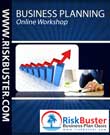 The world of business planning is haunted by shades of grey.
The world of business planning is haunted by shades of grey.
The benefits of business planning far outweigh the downsides. It is a healthy process for start-ups. Aside from accessing much needed financing, people gain knowledge and confidence as they research and write their own business plans.
Yet, most business start-ups won’t opt to write a business plan until they’re drop-kicked by someone or something. For a young person, it might be an insistent parent; for others, a banker, investor or gatekeeper. Some need to lose assets or go broke before they get the message. Start-ups are inclined to avoid anything that seems like “extra” work, and there’s no question that business planning entails a bit of work. It’s easy to see how a person might cheerfully bypass the opportunity.
Some of the resistance to business planning is due to the shades of grey.
The first glimmer of grey is found in the term “business plan.” An Internet search reveals that the term is used to describe a bewildering embarrassment of products and processes, from your monthly mobile bundle to grandiose marketing schemes, to diagrams etched into squares of high-grade toilet paper and glossy 100-page tomes. How are start-ups to know which system to choose? Those who seek financing will indiscriminately follow whatever path the lender tells them to. Those not seeking money have a challenge in front of them. It’s complicated… and grey.
The next shade of grey is “who to believe.” Google dumps a daily torrent of business planning articles and opinions into my inbox. There’s no shortage of claims that business planning is a waste of time and energy, apparently a fruitless pastime that entrepreneurs should shun. Many of the articles endeavor to pose alternatives to business planning, though I’ve not been able to see how the alternatives are better or different than business planning. They are only business plans with different logos.
Another shade of grey arises from the silly expectation that business planning will guarantee business success. There are no guarantees of business success. While a business plan will arm a start-up with more accurate knowledge and eliminate false assumptions, it can never make up for one’s inability to sell, a chronic propensity to procrastinate, or a knack for peeing in customer’s corn flakes. Anyone who confuses business planning with conducting commerce is doomed to a wild face-plant once in business.
Adding to the shades of grey is the difficulty in quantifying the benefits of having a business plan. From start-up onward, business owners are engulfed in risk. There are many factors that can take a business down, but absent are the charts and graphs that show definitively that a business plan helps keep a business alive.
The ultimate shade of grey is heaped onto business planning by the televised Dragon processes, where entrepreneurs get 7 minutes in the national limelight to pitch their business cases and field a few targeted questions from seasoned angel investors. Those who walk away with offers make it look quick and easy, right? It takes only a few minutes; why would anyone need a business plan? Lost in the floodlights and glamour is the fact that the entrepreneurs who get offered deals have done their homework, probably in the form of a business plan.
All but the tiniest of businesses are stronger with a business plan. When it comes to flushing out risks and mitigating liabilities, even mired in its shades of grey, I haven’t found anything as effective as a business plan.
 Only Six days left to access your $100 Early-Bird Discount for the Business Planning Online Workshop!
Only Six days left to access your $100 Early-Bird Discount for the Business Planning Online Workshop! Entrepreneurship has always been a key driver for job creation in our marketplace, and small businesses will continue to generate the lion’s share of new jobs in the future.
Entrepreneurship has always been a key driver for job creation in our marketplace, and small businesses will continue to generate the lion’s share of new jobs in the future.